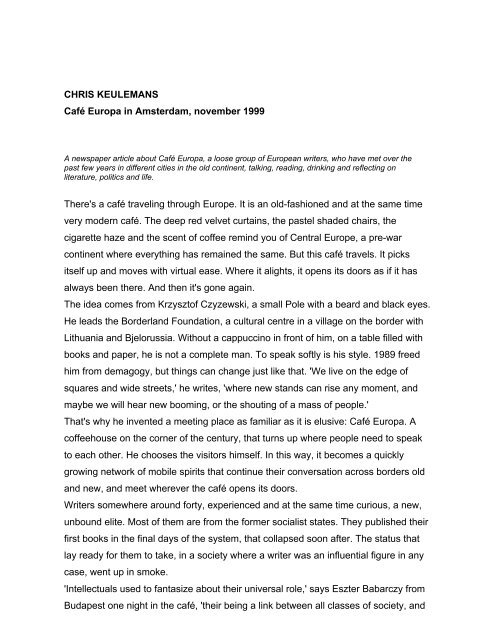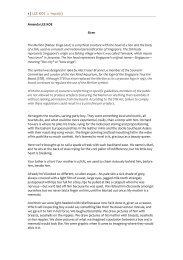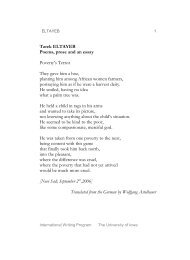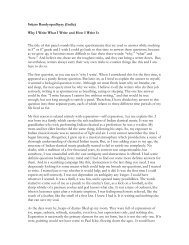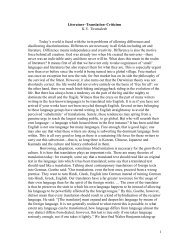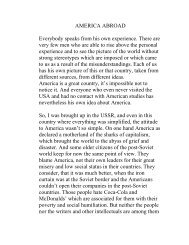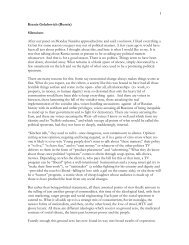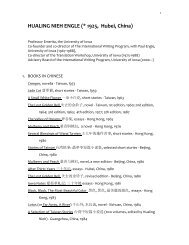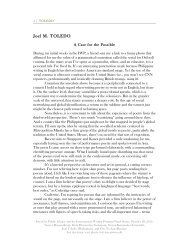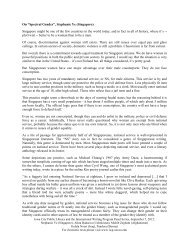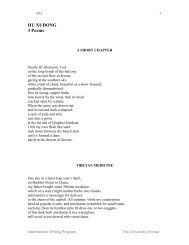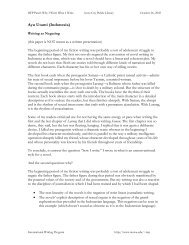Writing Sample - International Writing Program
Writing Sample - International Writing Program
Writing Sample - International Writing Program
You also want an ePaper? Increase the reach of your titles
YUMPU automatically turns print PDFs into web optimized ePapers that Google loves.
CHRIS KEULEMANS<br />
Café Europa in Amsterdam, november 1999<br />
A newspaper article about Café Europa, a loose group of European writers, who have met over the<br />
past few years in different cities in the old continent, talking, reading, drinking and reflecting on<br />
literature, politics and life.<br />
There's a café traveling through Europe. It is an old-fashioned and at the same time<br />
very modern café. The deep red velvet curtains, the pastel shaded chairs, the<br />
cigarette haze and the scent of coffee remind you of Central Europe, a pre-war<br />
continent where everything has remained the same. But this café travels. It picks<br />
itself up and moves with virtual ease. Where it alights, it opens its doors as if it has<br />
always been there. And then it's gone again.<br />
The idea comes from Krzysztof Czyzewski, a small Pole with a beard and black eyes.<br />
He leads the Borderland Foundation, a cultural centre in a village on the border with<br />
Lithuania and Bjelorussia. Without a cappuccino in front of him, on a table filled with<br />
books and paper, he is not a complete man. To speak softly is his style. 1989 freed<br />
him from demagogy, but things can change just like that. 'We live on the edge of<br />
squares and wide streets,' he writes, 'where new stands can rise any moment, and<br />
maybe we will hear new booming, or the shouting of a mass of people.'<br />
That's why he invented a meeting place as familiar as it is elusive: Café Europa. A<br />
coffeehouse on the corner of the century, that turns up where people need to speak<br />
to each other. He chooses the visitors himself. In this way, it becomes a quickly<br />
growing network of mobile spirits that continue their conversation across borders old<br />
and new, and meet wherever the café opens its doors.<br />
Writers somewhere around forty, experienced and at the same time curious, a new,<br />
unbound elite. Most of them are from the former socialist states. They published their<br />
first books in the final days of the system, that collapsed soon after. The status that<br />
lay ready for them to take, in a society where a writer was an influential figure in any<br />
case, went up in smoke.<br />
'Intellectuals used to fantasize about their universal role,' says Eszter Babarczy from<br />
Budapest one night in the café, 'their being a link between all classes of society, and
especially the downtrodden, their long journeys in underworlds, their role as<br />
spokesmen for people who populated them.' Eszter is inoffensive in appearance, like<br />
a butterfly; her essays are merciless. 'And now they have to acknowledge that this<br />
underworld is strange and dangerous for them. None of the new worlds are very<br />
welcoming, in fact. So some intellectuals changed into yuppies and some stay at<br />
home, tired and resentful. Some, again, try their hands at capitalism, a quasi or a<br />
tougher version, and some donned suits and entered parliament.'<br />
And the rest is sitting here at the small tables, smoking and talking. The Bosnian<br />
generation, Krzysztof calls them. A generation that only recognized the catastrophe<br />
when it was already too late. That is too late every time, all through the nineties.<br />
Extremely gifted, but never faster than the daily news. The war in Bosnia was the<br />
turning point for them personally, maybe even more so than the fall of the Berlin Wall.<br />
For the visitors of Café Europa 1989 meant a farewell to their youth, no more, no<br />
less. And what should follow, they couldn't say. The great freedom The slaughter on<br />
the Balkans killed every hope. An alternative was nowhere in sight. The only thing left<br />
to do for these writers was to write. To look for a personal answer where the<br />
collective answer had been swept away.<br />
And writing is exactly what they do. As if their life depends on it. Their productivity is<br />
impressive. Poetry, novels, theses, essays. And every week a column, to earn<br />
money. Commenting on the world, making a living. After the fall of the Wall they now<br />
live under the burden of columnism. They have become copywriters instead of<br />
grands seigneurs or dissidents.<br />
Café Europa arrived in De Balie last week, in the context of 'Through the Grapevine',<br />
a week about everything that happened since 1989. I sat down and felt at home.<br />
From the first encounter onwards, the recognition was immediate. The sense of<br />
humor, the obsessions, the taste: we found similarities everywhere.<br />
This congeniality of spirit didn't pop up out of nowhere. While these days all the<br />
newspapers arrive to the conclusion that the wall between East and West is in a<br />
sense still standing there, I discovered that for certain people, in a certain way it has<br />
never been there at all. That Europe did not consist of two separate worlds. I decided<br />
to do a completely unscientific test at random and handed out a small questionnaire<br />
to Krzysztof from Sejny, Eszter from Budapest, Ales Debeljak from Ljubljana, Mileta<br />
Prodanovic from Belgrade, Christopher Merrill from Woodstock, Pavel Huelle from
Gdansk and Migjen Kelmendi from Prishtina. What did they like during the seventies,<br />
the eighties and the nineties<br />
The answers by Dirk van Weelden, Esther Jansma, Joost Zwagerman and Bas<br />
Heijne (four Dutch writers of the same age, ck) would hardly look different, I think. In<br />
the seventies, when they were still at school, the visitors of Café Europa watched<br />
movies by Coppola, Fellini, Bergman and Kubrick. They read Hesse, Salinger and<br />
Danilo Kis. They learned something about Plato and Socrates and played records by<br />
Bowie, Springsteen, the Stones and Pink Floyd.<br />
In the eighties they studied philosophy, art history or literature, played in bands and<br />
entered their first editorial offices. They loved 'Paris, Texas', 'Down by Law' and<br />
everything by Tarkovsky, and discovered that there was more than rock music: not<br />
only Nick Cave but Miles Davis, not only local heroes like Idoli and Partibrejkers but<br />
Bach and Vivaldi. They studied the postmodern world of writers like Pynchon and<br />
Eco, and their predecessors Borges, Nabokov and Bruno Schulz, and thinkers like<br />
Benjamin, Wittgenstein, Barthes and Derrida.<br />
In recent years their literary career became ever more serious. They married and had<br />
children. Their musical taste became milder: Cesaria Evora, Madredeus, Bueno Vista<br />
Social Club. In poetry the old greatness of Milosz and Celan comes to the surface.<br />
The most impressive movie was 'Before the Rain' by the Macedonian director<br />
Mancevski. The most durable thinkers proved to be Hannah Arendt and Albert<br />
Camus, the most amusing the designers of the conspiracy theories that circulate as<br />
an explanation for the Balkan wars.<br />
In the nineties their tastes diverge more and more. The individual personalities<br />
develop themselves. Now they are writing individuals, no longer members of a<br />
subculture or a movement. And that is where their dilemma lies: the choice between<br />
artistic isolation and political responsibility, between participating and keeping<br />
distance.<br />
After 1989 the writers didn't remain free from political obligations for a very long time.<br />
Almost everyone in Café Europa can share this experience. They were thirty back<br />
then: too young for a suspicious history with the party and too old to stay indifferent<br />
towards the future of their country. Something was being expected from them. The<br />
postmodernists were called upon to become nationbuilders. An impossible task. They<br />
had become allergic to ideology for good, and couldn't join in with the retorics of the
new republics that were created everywhere. That the names of people, minorities<br />
and regions became politicized infuriated them.<br />
Above all: how should a writer who during the eighties discovers that identity is a<br />
fiction and reality is a construction of language contribute just a few years later to<br />
something like a new national identity<br />
The only reality in which they really feel at home is that of the city. How their cities<br />
have changed is something they discuss in the café. Difficult to say, according to<br />
Eszter Babarczy: the speed and the volume of city life have accelerated, but so has<br />
her perception of speed and volume. One thing is for sure, says Ales Debeljak, the<br />
most talented poet of his generation in Slovenia: after the fall of the Wall came the<br />
rise of the mall. The market is taking over, be it McDonald's or mafia.<br />
Not a bad thing, he thinks, those contrasts: 'Even the most basic commerce teaches<br />
people that choices exist. This situation is preferable to the past. Nostalgia is the last<br />
refuge for people without imagination. Just like the false utopia of the multicultural<br />
society. Both exclude other possibilities. My city, Ljubljana, exists right on the crack in<br />
the middle, and that is why I like it there. A city is like a parachute: it only works when<br />
it's open.'<br />
On the final evening two young men with grey hair sit at the table in the middle.<br />
Writers from war cities: Migjen Kelmendi from Pristina and Mileta Prodanovic from<br />
Belgrade. For a moment I imagine: this is November 1945, and we see a German<br />
and Jewish writer sitting there. What have they got to say to each other<br />
Earlier that night Antonije Zalica has read from his novel about Sarajevo, written after<br />
his escape to Amsterdam: how the inhabitants of the besieged city had to become<br />
magicians. And Eqrem Basha, the endearing francophone from Pristina, recited old<br />
poems already haunted by violence and desolation. This spring, he spent the whole<br />
war in his flat, on the ninth floor, with a view on the street below where people were<br />
being clubbed down in front of the police office. This too is the new Europe: cities that<br />
will not open and plunge into the depths below. Migjen and Mileta sit opposite of<br />
each other, their faces tight with concentration. The café is silent. The bustle has<br />
fallen still. They are courteous, do not utter accusations and honor one another's<br />
heroes: Kis from Belgrade, Surroi from Pristina. They speak mainly about the<br />
shortcomings of their own city.<br />
Mileta calls Belgrade a ghetto encircled by a double wall. Neither Milosevic nor the<br />
European Union prefers anyone to leave or enter. In the city the new rich build kitsch
palaces with stolen money, 'with the death of innumerable innocent people built into<br />
their walls.' The apathetic population allows itself to be robbed and deceived by those<br />
it elected to power itself. 'The fall of Belgrade is total,' he says, 'in visual, moral,<br />
material, intellectual and all other aspects.'<br />
'If you want to cook a living frog you can do it in two ways - you can put the animal<br />
into a pot of boiling water and the frog will, naturally, squirm. But if you put the frog<br />
into a pot of cold water and start to heat readually up to the point of boiling, the frog<br />
will be cooked without any resistance. This slow but steady decay, impoverishment<br />
and anesthetisation op people is the main characteristic of life in Yugoslavia during<br />
the last decade.'<br />
But at least Mileta still has the capacity of self-recflection. Migjen is worried that the<br />
people in Pristina might have lost that capacity, now that the war has come to an end.<br />
He tells a strange, true story. They don't have a river there. That is to say: they hád<br />
one, but it was buried entirely during communism, when the pollution and the smell<br />
became unbearable. 'So they literally built a cement sarcophagus for my river.'<br />
For years no one mentioned the river. Almost everyone had forgotten about it. Only<br />
last spring, 'after the deportation of the citizens, when the city was empty of the living,<br />
wrapped in death silence, was it possible to hear the weeping and screaming of the<br />
river. And now my city and I have a big problem: how do we know how we look<br />
without the river How will the city look at itself without the mirror of the river's<br />
surface'<br />
At that moment Christopher Merrill jumps in. 'We have the same thing in the States!<br />
Rivers that were covered are being dug up. Daylighting, is what we call that. Bringing<br />
things back into the light of day. And is that not exactly what every writer is trying to<br />
do'<br />
The writers in Café Europa uncover the past. Or the underworld, or countries abroad.<br />
This is their way to go and face the future. They may arrive too late, but that is no<br />
reason not to take off. Without traveling here and there they would sink away in the<br />
lethargy and the cynicism that surround them. It is not for nothing that most of these<br />
writers mention New York as their second city.<br />
In the middle of these tirelessly talking men and women, who establish new contacts<br />
so easily, I understand the the function of an elite for a society. The new Europe<br />
needs a new elite, in the most positive sense of the word, and here they are.<br />
Pioneers, bordercrossers, daylighters, influential, but free of power and positions.
Heavy drinkers they are not; light travellers they are. Magda Carneci, an elegant poet<br />
from Rumania, has already been talking to Krzysztof. Next summer Café Europa will<br />
open its doors, as long as it lasts, somewhere on a square in Bukarest.
David and Jonathan Richman, Dartmouth College, Hanover (NH), March 1978<br />
(from the upcoming novel ‘The American I never was’)<br />
In which David, one of the two main characters in my next novel ‘The American I never<br />
was’, has his first ever interview, for a college magazine called Doctor Tuck, with none<br />
other than pop singer Jonathan Richman. Other than most people, David recognizes<br />
something serious and fragile in Richman’s new songs, that most people regard as a joke<br />
at the time.<br />
They had turned the sound level real low, last night. No higher than one and a half. It<br />
confused people. It has been very difficult lately to keep your credibility. Just week we<br />
were all jumping around to the Dead Boys. That night, it was all about showing you<br />
just didn’t care. We smashed our bodies into each other. Now, we had to stand around<br />
quietly and look like we completely understood why a boy with a red crewcut, a<br />
white t-shirt and baggy trousers, who looked like the kid next door in an old episode<br />
of Ozzie and Harriet, was standing there, plucking his upright base and buzzing like a<br />
bee, bzzzz, while his boss up front, singing so softly as almost to be whispering that it<br />
was a lazy summernight, politely requested the insects not to land on his arm. Bill and<br />
Wesley, who were standing to the side of the stage, flashed each other a superior grin,<br />
as if they were completely in on what was going on here. They had been grinning like<br />
that even through the support act: a very old magician and juggler who managed to<br />
keep two axes and three basketballs in the air simultaneously.<br />
Collis isn’t a very high place. When that axe stuck into the ceiling something<br />
inside me split open. I literally felt it that way. I have a wooden heart. And suddenly I<br />
understood the beauty of things that don’t fit together. An axe and a basketball, John<br />
Cale and Jonathan Richman, a snowman and a supermarket. And the space in<br />
between. That space, that is where you have to be. That is where you are free and<br />
weightless, and if you want, but only if you really want it yourself, it is there that you<br />
can make a connection between things. Suddenly, I was serious with happiness, and I<br />
stayed that way long after the sixteenth time that the Modern Lovers started into ‘Ice<br />
Cream Man’ again.<br />
Would I be able to talk with Jonathan Richman about things that don’t fit together<br />
What do you actually wear for your first interview I played his two records all through
the night. At daybreak I left the house. The streets were empty. The trees stood rooted<br />
in their pits, having only just returned from the delirious flights they make in the dark.<br />
I saw someone riding a bike in the distance. He had red hair and a little red dog in the<br />
basket on his handlebars. The mailman The base player Between the bush along the<br />
Connecticut River my shoes sank into the mud. I left them there and went for a swim<br />
in the water, making little circles, just like my own thoughts.<br />
But now things are becoming serious. I park the old Buick in front of the<br />
Sunset Motor Inn. My foot gets out of the car. For a moment, it hovers just above the<br />
ground. Then it places itself firmly on solid ground. This is my own little landing on<br />
the moon. I knock on door number 8. Nothing happens. I walk around the motel,<br />
along the sloping grass at the back that looks out over the river. There he is. Sitting in<br />
a garden chair, guitar on his lap. ‘Hi Jonathan,’ I say. ‘I’m David. Special correspondent<br />
Doctor Tuck.’<br />
‘Hi David,’ he says. ‘Nice to meet you. Let’s go.’<br />
So what about my first question He goes inside and returns without the guitar.<br />
He’s still wearing the faded green t-shirt, University of Santa Clara, that he had on last<br />
night. His eyes are clear. Strange eyes. Cheerful and frightened at the same time. As if<br />
he’s looking forward to something so much that he starts joking about it in case it<br />
won’t live up to his expectations after all.<br />
He wants to go to the Cold Spring Café. He saw it yesterday, when the band<br />
drove into Hanover yesterday. He’s right. I like it there too. It has a high window on<br />
South Main Street, with bar stools in front of it. You put your coffee on the window sill<br />
and the view moves by all by itself. The music is good and even the coffee can pass. It<br />
is the ideal location for a first interview. I drive steadily into town, the promise that<br />
today I will think clearly and precisely shivers right through me.<br />
‘Why aren’t you wearing shoes, David’<br />
‘I went swimming this morning, and they stayed behind in the mud.’<br />
‘Ah, I see. Did you see turtles’<br />
‘Yeah, two, pretty big ones. But they couldn’t keep up with me. We lost<br />
contact.’<br />
‘Was it cold’<br />
‘Not really. I was thinking about axes and basketballs, and I forgot about<br />
temperature.’<br />
‘Yes, Eugene is really good, huh’<br />
‘Eugene’
‘The magician. He uses live animals sometimes. Cats, rabbits. My favorite is<br />
when he uses doves. He does that only among friends, on nights when we have some<br />
more time, outside on the porch. He throws them into the air one by one, and if you<br />
sit there long enough they’ll come down again all by themselves.’<br />
Is this the interview already Should I have written this down I park the car<br />
around the corner, in Allen Street, and we walk to the café. There is no one there yet.<br />
All the chairs and bar stools are free. They are playing something in Spanish. Behind<br />
me I hear Jonathan grunting in appreciation. It sounds strange, because his voice is<br />
really too high to grunt. It is a high grunt.<br />
We go and sit by the window. The people in the bank building across the street<br />
are doing their work. ‘Look,’ says Jonathan. A girl walks past our window. Ze has a<br />
serious look in her eyes. Her little backpack is full. Her short hair reminds me of Liza<br />
Minelli. But her shoulders are sagging, she doesn’t feel like whatever she has to do.<br />
Then she is gone.<br />
‘Did you see she’s from Boston’<br />
‘Excuse me’<br />
‘Yeah, just like me. And she’s homesick. You can tell by her knees. Her knees<br />
are from Boston. They miss the harbor. Harbor knees, that have been grown raised to<br />
walk into the wind, I wouldn’t want to trade them for surfers knees or skiing knees or<br />
any other knees in the world. Look!’<br />
Another girl walks by. Tanned and cheerful. When she sees us sitting there she<br />
winks at us. Jonathan acts like he wants to dive away behind the window sill. When<br />
he gets back on his bar stool I see he was really frightened.<br />
‘Did you see that ponytail Did you see it jump It is trapped on the back of the<br />
head of cheerleader from Florida. Wait, I’m gonna help it escape.’ He darts out the<br />
door. Do I go with him It’s too late already. Suddenly, I am alone with the view.<br />
Jonathan’s tea stands there, letting off clouds of steam like it had been doing. It has<br />
become used to this. It knows Jonathan will always return. Jonathan doesn’t drink<br />
coffee. And he eats no meat. I read that in Addicted to Noise. He doesn’t smoke and<br />
he doesn’t drink. He doesn’t touch drugs.<br />
At first, that was a disappointment. How do you take someone seriously who<br />
live on tea and vegetables But now I am starting to understand. This is becoming a<br />
strange interview, I guess. I am not asking any questions and he is not giving any<br />
answers. An interview with someone who just walks out the door. But still. The longer<br />
he stays away, the better I understand what he means.
He takes everything very seriously. He respects insects that want to land on his<br />
arms. Homesick harbor knees. Trapped ponytails. Animals they want to cut up, bake<br />
and put on his plate. He has so much respect that it makes him vulnerable. Permeant.<br />
He notices everything. The smallest things. They all call for his attention, and it almost<br />
hurts him to answer every time. That explains the seriousness in his voice. The frailty.<br />
Ah, there he is again. ‘Failed,’ he gasps. ‘I didn’t catch it. I mean. She escaped<br />
me. I mean – well, you know what I mean.’ I nod. What can I say<br />
He sits down and takes a sip of the tea that has been waiting for him.<br />
‘What was it you wanted to know’ He looks at me kindly, as if he’s come to<br />
Hanover especially to hear what I wanted to know about Jonathan Richman. And then<br />
to write a song about that. The things I wanted Jonathan to tell me about himself. It<br />
confuses me.<br />
‘David, do you love America’<br />
‘Yes, but…’<br />
‘No, I mean it. See that bank building across the street’ The people there are<br />
doing their job. Making telephone calls or calculating things. They help the customers<br />
at the counter. ‘That bank building is America. Have you ever been in there Neither<br />
have I. But I’m sure. Let me explain.’<br />
I never really paid attention to it. It’s a low little building with a reddish brown<br />
brick front. There’s only one story. It’s nothing more than a bank. They really want<br />
you to look inside, because almost the whole storefront is made of glass. And inside<br />
they decided that all the smaller surfaces should be orange, a modest, unimpressive<br />
kind of orange. The doorknobs, the counter top, the pot from which a tall, withered<br />
plant welcomes the visitors, the employees’ jackets, the heating radiators and half of<br />
the floortiles, so that the customers stand on an orange-grey chess board. This bank is<br />
really quite attached to the idea that money changes owners in an orange<br />
environment.<br />
‘Boredom is the normal state of things there,’ says Jonathan. He is sitting next to<br />
me, the author of ‘Pablo Picasso (was never called an asshole)’, holding a cup of tea,<br />
and we’re both concentrating on a small bank with orange heating radiators. ‘And<br />
that’s good. Boredom is what makes the world go round. People think that it’s the<br />
pioneers and the inventors that help America forwards, but that’s not true. It’s the bank<br />
tellers and the girls in the supermarket. People who are not afraid to repeat<br />
themselves. Who do the same today as they did yesterday. Remember our magician,<br />
who did the warm-up act before the show last night Marv is great. He’s almost ninety<br />
and there’s holes in his memory the size of Lake Winnipesaukee, but put him on stage
and he’ll pull rabbits out of his high hat. Because that’s what he’s done all his life.<br />
When I was five he was already doing that. Marv is my grandpa, did you know that<br />
To me it’s the most normal thing in the world to see rabbits jumping out of high hats.<br />
To me, it’s not a miracle and I don’t go looking for the trick behind it, to me it’s an<br />
everyday thing. That’s what I mean. The most important things are the things that<br />
happen every day. Not the things you experience for the first time, but the things you<br />
recognize with your eyes closed.’<br />
He looks at me. ‘I love that bank building because it does what it’s supposed to<br />
do.’ The moment is almost ceremonial, and he seems completely at ease with this<br />
ceremony. ‘Just like the motel where I’m staying. Or that little suburb along the river.<br />
Those low apartment buildings, three or four stories high, painted yellow and white,<br />
unchanged since they were built there in the fifties. The people who live there never<br />
seem to get any older. Their life begins at the some point in time every day. I walked<br />
by there this morning. I saw those apartment buildings in the bleak morning sun, and<br />
it made me think of a New York girlfriend I once had. She didn’t understand that I still<br />
loved the fifties, and still loved my parents. Grow up! she’d say. This is the seventies.<br />
Neon lights, the radio on ten! But she didn’t get what it was about for me. Do you love<br />
your parents, David’<br />
I knew he was going to ask me that.<br />
‘Yes. Very much.’ It’s important to give him a short and clear answer. He nods.<br />
‘This is not about nostalgia,’ he says. ‘That’s what she didn’t understand. I don’t<br />
want to live in the fifties. I don’t want America to stand still. But it moves me, to see<br />
those fifties apartment blocks in the bleak nineteen seventies sun. The old world and<br />
the new world, and me in between. The new world has to move forward, and I help it<br />
do so. I write new songs every day. But not everything and everyone has to join in. If<br />
things are good at something, I don’t think they should change. The same goes for<br />
people. Marv is good at pulling rabbits out of his hat. Why would he have to change<br />
to doves, or colored handkerchiefs Why should Marv buy a new hat The hat he owns<br />
is fine. I wrote a song about it once. The day Marv bought his old hat. But the record<br />
company didn’t want to have it on the album. It was too nostalgic, they said. They<br />
were worried about their progressive image. So then I changed record companies.<br />
That’s my way of helping the world move forward.’<br />
He suddenly giggles and gets up. ‘David, I’ve got to go. You really helped me a<br />
lot. Thank you. And don’t forget your shoes.’ Then he walks outside. He passes by the<br />
window, waves, his eyes now frightened with excitement again, and then he’s gone.
Doctor Tuck! How do I get this into Doctor Tuck What, actually, I ask myself,<br />
suddenly heavy on my bar stool. I haven’t taken any notes. I just sat there listening.<br />
The bank office across the street keeps on doing its business. The withered plant<br />
stands in its pot and only now do I recognize its painful similarity to the worst, least<br />
talented rock journalist in Hanover.
THE AMERICAN I NEVER WAS<br />
a novel, a website and a tv-documentary<br />
concept and text<br />
producer<br />
interactive designer<br />
filmmaker<br />
Chris Keulemans <br />
Submarine (Bruno Felix en Femke Wolting)<br />
Madelinde Hageman<br />
Rob Smits<br />
WHAT<br />
The novel tells the stories of Chris and David, both born in 1960.<br />
Chris grows up in Burkina Faso, Bagdad and Jakarta. In American schools he is<br />
raised to be a little patriot, without ever having been in America. Later, in Amsterdam<br />
and Belgrade, the squatters movement and communism teach him to mistrust the USA.<br />
David, the American he never was, grows up in the middle-class suburbia of<br />
Cranford, New Jersey. He becomes attracted by the old Europe and punk music, and<br />
moves to London in 1980.<br />
That’s where they meet: two young writers, addicted to music, movies and<br />
television. They become friends, then travel in contrary directions. David makes a trip to<br />
Indonesia, returns with brain cancer and dies. Chris then decides to finally go and look<br />
for his place in America – only to discover that popculture hasn’t prepared him for reality.<br />
The novel is written in the present tense: curious, restless, no nostalgia.<br />
The website presents all the material surrounding these life stories: the music, books,<br />
movies, cartoons and television that together construct the image of America – of white<br />
middle-class New Jersey, to be precise. People can subscribe. They will receive a weekly<br />
e-mail by the author, telling them where the main characters are and what this week’s<br />
issue is. He invites them to add their own images and stories to the website: because<br />
everyone builds their image of America in their own way.<br />
The documentary is a roadmovie along the cities of New Jersey, about a man coming<br />
home where he has never lived. The images he constructed on the outside, as presented<br />
on the website, hardly fit into the images on the inside. He is guided through the beauty,<br />
the grimness and the indifference of the Garden State by artists like Amiri Baraka, Junot<br />
Diaz, Kevin Smith and Rah Digga. The documentary is an associative journey, where<br />
images from the ocean of pop culture crash into life on the flipside of New Jersey.<br />
WHO<br />
Chris Keulemans is a writer and a journalist. He is the former director of De Balie,<br />
centre for culture and politics in Amsterdam.<br />
Rob Smits is a tv director and cameraman with a long experience at Dutch broadcasting<br />
company VPRO. His series of films shorts ‘Observations in Holland’ (with Britta Hosman)<br />
was shown at festivals around the world.<br />
Submarine is an independent Amsterdam studio producing convergence programming<br />
and formats. Submarine focuses on the creation of true new media formats that make<br />
use of the explosion of media channels and outlets.<br />
The novel will be published by Dutch publishing house Meulenhoff.<br />
The documentary will be broadcast on Dutch public television.<br />
WHEN<br />
Novel and documentary will appear at the end of 2002.<br />
The website will open six months previously.


